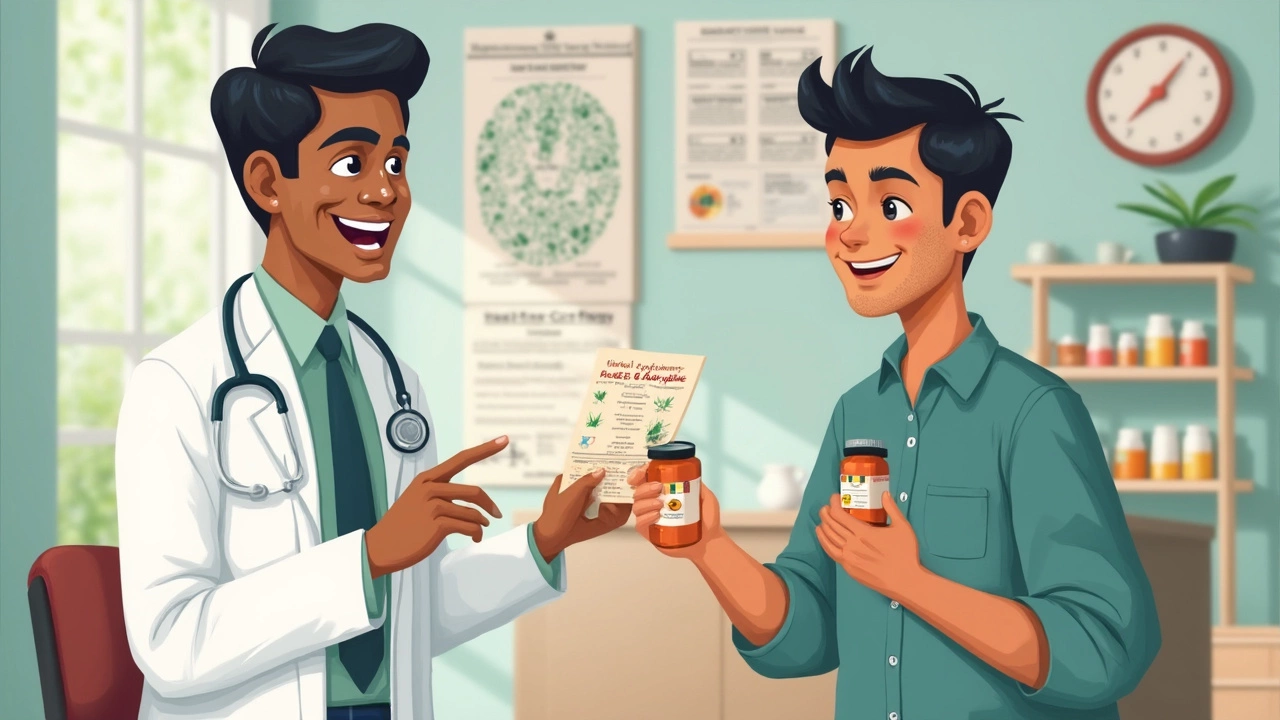Everyone's got that friend, aunt, or coworker who swears by a little bottle of herbs from the health aisle. You might wonder if popping herbal supplements each morning could make your life better, or if it’s more hype than help.
Before you get on that bandwagon, it’s good to know herbal supplements aren’t regulated like prescription meds. That means the dose in one capsule might not even match the same brand’s next bottle. And while “natural” sounds safe, nature does not always play nice—plants can mess with your meds, or even cause allergic reactions.
Some herbs, like echinacea for colds or ginger for nausea, do have real fans and some actual research behind them. But there are also lots of old wives’ tales and marketing tricks in this space. Instead of guessing, it’s smarter to learn what works, what’s risky, and how to read those tiny labels everyone ignores.
- Why People Turn to Herbal Supplements
- Can Herbal Supplements Really Help?
- The Hidden Risks No One Talks About
- Smart Ways to Use Herbal Supplements
- Talking to Your Doctor: What to Ask
Why People Turn to Herbal Supplements
Walk into any pharmacy or supermarket today, and you’ll see rows of plant-based capsules and teas promising everything from better sleep to more energy. It’s not just hype—according to the National Center for Complementary and Integrative Health, about one in five American adults used an herbal supplement in the past 12 months.
What’s the draw? For a lot of people, it’s about feeling in control. Big pharma can seem cold and complicated, while herbs feel like something Grandma or Mom might have once used. Some folks hope for fewer side effects, or just want to “go natural.”
Herbal supplements also look appealing for specific complaints that doctors can’t easily fix, like mild anxiety, bad sleep, or stiff joints. Info spreads fast—if your friend says ashwagandha helped his stress, it’s tempting to buy a bottle.
"People want a sense of empowerment: taking something they feel is safe, natural, and within their control,” says Dr. Michael Smith, medical director at WebMD.
- Convenience—no doctor’s script needed
- Avoiding synthetic chemicals
- Desire for a gentler approach
- Social proof—friends, family, or influencers recommend it
- Believing herbs are safer than medicine (sometimes true, sometimes not)
Just to give you an idea of the popularity, here’s how common different herbal supplements are in the U.S.:
| Herbal Supplement | % of US Adults (2023) |
|---|---|
| Turmeric/Curcumin | 17% |
| Echinacea | 11% |
| Ginseng | 9% |
| Gingko Biloba | 6% |
| St. John’s Wort | 5% |
The numbers make it clear: herbal products aren’t niche anymore. They’re part of a regular health routine for a lot of people—sometimes as a first step, other times as a last resort when nothing else has worked.
Can Herbal Supplements Really Help?
There’s a lot of hype around herbal supplements, and it can be hard to tell what actually works. Some herbs really do offer benefits, but not every claim you see on the bottle is backed by real results.
Let’s break down some big hitters. Studies show ginger can help with nausea—think morning sickness or motion sickness. Peppermint oil has been found to soothe IBS symptoms in some people. Turmeric, thanks to curcumin, gets a lot of buzz for easing joint pain. Echinacea? It might shave a day off a cold, but don’t expect miracles.
There’s also a long tradition behind stuff like ginseng for energy and St. John’s Wort for mild depression. But the science isn’t always slam dunk. Take St. John’s Wort: it works for some mild-to-moderate depression, but can mess big-time with other medications so you have to be extra careful.
If you’re curious, here’s what to do first:
- Look for clinical studies, not just testimonial posts or pretty packaging.
- Check if the herb has been tested for the thing you actually want it to help with.
- Remember, herbal supplements aren’t meant to cure everything—they’re more about giving a little support.
And just because an herb works for one person or even one culture, that doesn’t mean it’s right for you. If you’re thinking about trying something, do a quick scan for real facts, not rumors, and always keep your other meds in mind.

The Hidden Risks No One Talks About
It’s easy to think anything with “herbal” in the name must be gentle or harmless. But here’s the bit most people skip over—just because something is plant-based, doesn’t mean it’s always safe. In fact, a report from the U.S. Centers for Disease Control and Prevention found that over 23,000 people each year end up in emergency rooms from supplement-related problems, with herbal supplements being a big chunk of that number.
Let’s get specific. St. John’s Wort, a common mood booster, can actually mess with your birth control or even heart meds, sometimes making those prescriptions less effective. Kava, which some people take for stress, has been linked to serious liver damage. And taking ginseng or ginkgo while on blood thinners can raise your risk of bleeding. The list goes on.
If you think the bottle says all you need to know, here’s a shock: supplements don’t have to prove they work before hitting store shelves, and the FDA doesn’t check them for safety like it does with regular medications. Sometimes, what’s printed on the label doesn’t even match what’s inside the capsule. A 2023 study by ConsumerLab tested 50 herbal supplements and found 12 of them had different doses than the label claimed, and a few even had unlisted fillers.
| Herbal Supplement | Known Risk | Common Drug Interactions |
|---|---|---|
| St. John’s Wort | Reduces effectiveness of meds | Birth control, antidepressants, HIV drugs |
| Kava | Liver damage | Anti-anxiety meds, alcohol |
| Ginkgo Biloba | Bleeding risk | Blood thinners, aspirin |
| Ginseng | Blood pressure changes | Diabetes meds, blood thinners |
Watch out for allergies too. Chamomile and echinacea can trigger reactions if you’re sensitive to related plants. And “extra strength” doesn’t mean extra safe—some herbs become toxic in high doses, even things like licorice root.
If you decide to go for an herbal supplement, play it smart. Double-check that none of your meds interact, use just one new supplement at a time (so you can spot anything weird), and keep an eye out for any unusual symptoms. And remember, more doesn’t always mean better—especially with herbs.
Smart Ways to Use Herbal Supplements
If you’re thinking about adding herbal supplements to your daily routine, don’t just grab the first thing off the shelf. There’s a right way and a risky way to use them. Companies sell thousands of herbs, but not all are made equal, or even safe. Here’s how to boost your chances for real results and avoid headaches (or worse) down the line.
- Check for Quality Seals: Look for third-party seals like USP, NSF, or ConsumerLab on the bottle. These groups test for things like correct dosing and making sure you’re not getting mystery ingredients or heavy metals. Most supermarket brands don’t have this, but some big pharmacy chains now carry accredited options.
- Know Your Dose: More does not mean better. For example, taking too much ginkgo can thin your blood dangerously, while too much licorice root can mess with your blood pressure. Most supplements list a serving, but always double-check reputable medical sites or pharmacists for what’s actually safe.
- Start Simple: One new pill at a time. If you have a bad reaction, you’ll know the culprit. Starting a bunch of products at once? You’re playing whack-a-mole with your health.
- Take Notes: Notice changes—good or bad. Write down when you start something new, any weird symptoms, and how you feel after a few days or weeks. Bring these notes if you ever need to talk with your doc about it.
- Avoid Mixing with Meds: Herbal supplements can clash with medications. St. John’s wort, for example, can make birth control less effective and affect antidepressants. Always check for possible interactions before adding new herbs.
Here’s a snapshot of some common herbs, what they’re often used for, and known risks, just so you’re not guessing in the dark:
| Herb | Popular Use | Known Risks or Interactions |
|---|---|---|
| St. John’s Wort | Mood, mild depression | Reduces effect of many meds (birth control, antidepressants); sunlight sensitivity |
| Ginkgo Biloba | Memory, focus | Blood thinning, bleeding risk especially with aspirin or warfarin |
| Ginger | Nausea, motion sickness | Possible blood thinning; can cause heartburn in some |
| Garlic | Heart health, cholesterol | Bleeding risk; lowers blood pressure; can interfere with HIV meds |
| Turmeric | Inflammation, joint pain | Stomach upset, may interact with blood thinners |
Last tip—don’t fall for wild promises about curing diseases or losing 20 pounds in a week. If something sounds too good to be true, it almost always is. Stick with known benefits, respect your own body’s signals, and talk to a professional if anything feels off or confusing.

Talking to Your Doctor: What to Ask
Don’t assume your doctor will automatically know which herbal supplements you’re taking unless you bring them up yourself. This isn’t just a formality—mixing the wrong herbs with even common prescriptions can mess you up. Here’s the thing: about 1 in 4 people taking prescription meds are also using some kind of supplement, yet less than half ever mention it to their doctor.
Before your appointment, jot down the names and dosages of all the herbs you’re using. Even better, snap a photo of your bottles. Why? Because names can be confusing—some supplements use Latin names, others just slap a catchy label on there. Being specific helps your doctor check for real risks.
Not sure what to ask? Start with these:
- Could this supplement interact with my prescriptions or any conditions I have?
- Are any of these herbs known for side effects like liver or kidney problems?
- Which brands are tested for purity and safety?
- How long should I take this before expecting results, and when should I stop?
- Is there any solid research backing up these claims, or is it mostly anecdotal?
Here’s a quick chart that shows some known interactions of popular herbal supplements with common meds:
| Herbal Supplement | Common Meds They Interact With | Possible Effect |
|---|---|---|
| St. John’s Wort | Antidepressants, birth control, blood thinners | May reduce effectiveness; increase side effects |
| Ginkgo Biloba | Blood thinners, anti-seizure meds | Higher risk of bleeding, seizures |
| Ginseng | Diabetes meds, blood thinners | Can lower blood sugar too much, bleeding risk |
| Black Cohosh | Liver medications | Liver damage |
Be honest with your doctor—even if you’re dabbling with supplements you bought online. Your doc isn’t there to judge you; they're there to keep you safe. Asking clear questions means less guessing and fewer nasty surprises. That’s how you make the most of herbal supplements without risking your health.
